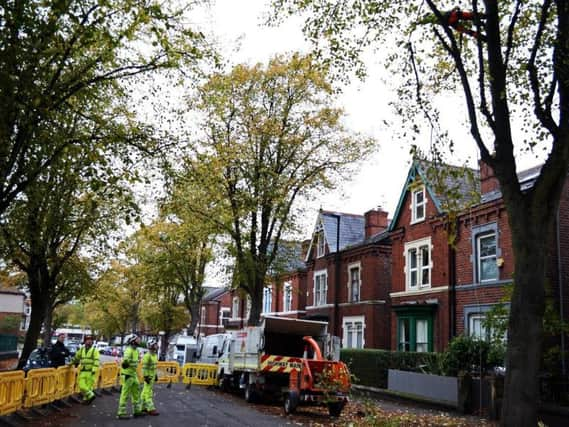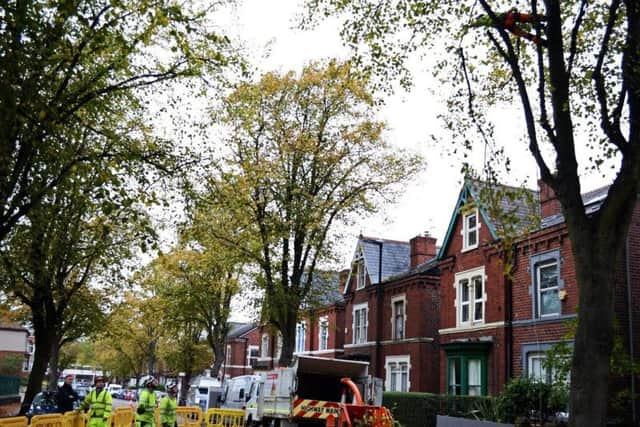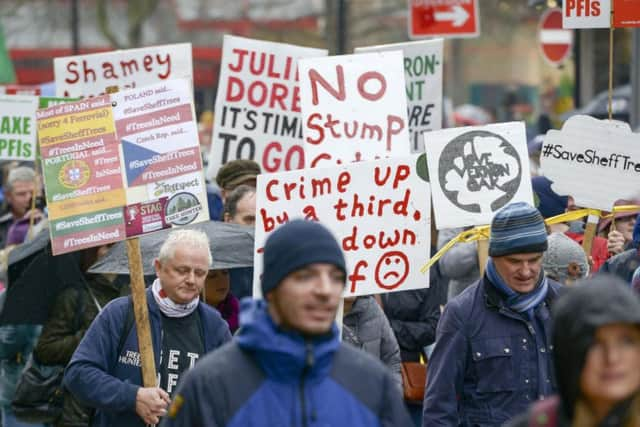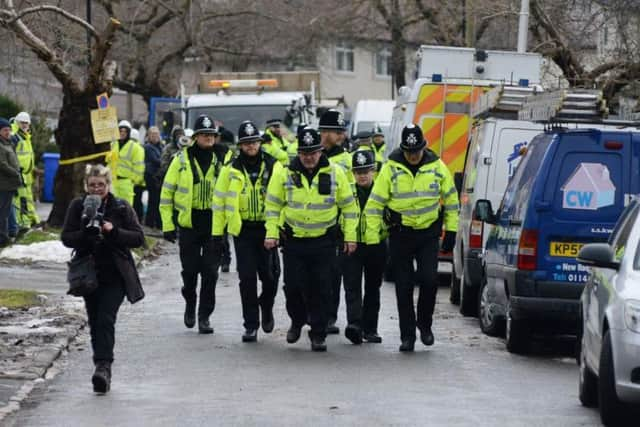Five damning findings from the Sheffield trees investigation


The Government agency ruled there was “insufficient evidence” to attempt a prosecution for felling without a licence but strongly criticised the council for falling “far short of good practice” in a number of areas, including in its record-keeping, engagement and consultation, tree management techniques and contract management.
Here are some of the key findings from the report:


Advertisement
Hide AdAdvertisement
Hide Ad1. Around 600 trees may have been felled illegally - but no prosecution will take place
The Forestry Commission was investigating whether Sheffield Council and Amey required felling licences for the mass removal and replacement of trees they were conducting under a £2bn highways contract known as Streets Ahead. Doing so without a licence where it is required is an offence that can result in a fine “twice the sum which appears to the court to be the value of the tree”.
The council had argued such licences were not necessary as the work was conducted as part of its statutory highways duties.
However, the FC decided to investigate after details of the Streets Ahead contract were made public in early 2018 and showed it included “a commitment to fell 200 trees per year”, which the commission says meant the work could have been happening as a policy decision rather than a statutory duty.


Advertisement
Hide AdAdvertisement
Hide AdUsing historic photographic evidence of sites where trees had been felled, the Forestry Commission assessed a sample of 691 trees to see whether licences would have been required in each case. It found 77 of them - 11 per cent of the sample - “could not confidently be assessed as being excepted from the need for a felling licence”. However, no single tree was categorised as having "robust evidence" that the exception did not apply.
From expanding out the sample to the total felling programme, the FC found “potentially around 600 trees were felled by SCC and Amey which may have required a felling licence… an offence may have been committed”.
But the FC said it would have needed to gather sufficient evidence to demonstrate that “felling clearly ‘appears’ to have required a licence” to put a case for prosecution to the CPS, who would then conduct their own evidence test.


Advertisement
Hide AdAdvertisement
Hide Ad2. Sheffield Council repeatedly failed to provide information to investigators
The Forestry Commission formally began its investigation on April 19, 2018 after the council failed to respond on March 26 that year to a request for evidence that a felling licence had not been required.
The commission asked for felling to be suspended apart from those trees posing an immediate danger to the public. At that stage, work had already been put on hold following increasing protests against the policy, multiple arrests and national political pressure for the programme to be rethought.
The FC report says Sheffield Council “repeatedly failed” to provide the information requested in March during several rounds of correspondence, leading the agency to make a formal request under environmental regulations for the evidence with an associated warning that a failure to provide it by May 25 would result in a complaint being made to the Information Commissioner.
Advertisement
Hide AdAdvertisement
Hide AdSheffield Council replied on May 25 with a spreadsheet showing details of records for 5,474 trees that had been felled including details of why it felt a licence was not required. But the FC says other details that were requested such as the size of the felled trees, the date of felling and information on replanting, was not provided.
Further information was requested from the council on June 5, with the council replying on July 30 but providing “no further substantive evidence to support the exceptions being claimed apart from the details relating to tree condition”.
The report concluded that if the council had shared more substantial information a full investigation would have been unlikely to have been required.
3. Council’s approach lacked adequate consultation from the start - and has cost taxpayers’ money
Advertisement
Hide AdAdvertisement
Hide AdThe report criticised Sheffield Council’s insistence that all correspondence went through their legal team rather those directly in charge of street management. It said this approach was symptomatic of how the council’s more general approach to the issue.
“More open engagement by SCC may have revealed earlier in the process that exceptions did apply to the felled trees and may have saved the FC, SCC and the wider taxpayer both time and money.
“Indeed, this case has been characterised by a lack of adequate engagement and consultation by SCC from the very beginning. This is not only in relation to the FC assessment of alleged illegal felling, but can be traced back to the very beginning of the Streets Ahead programme. SCC failed to adequately engage their primary stakeholders, local residents. The formation of Sheffield Trees Action Groups is symptomatic of this lack of consultation, and a direct consequence of attempting to deliver a service without the engagement and buy-in of service users.
“Had genuine consultation and feedback been sought and acted upon at an early stage, and the Streets Ahead programme adapted as a result, the FC would likely not have been required to assess SCC’s felling programme, and some of the 5,474 trees that were felled might still have been standing.”
4. Felling was not a 'last resort'
Advertisement
Hide AdAdvertisement
Hide AdSheffield Council had repeatedly defended their felling programme by insisting that trees were only ever removed as a "last resort". But the commission's report highlighted other options the council could have taken instead of felling thousands of mature trees and replacing them with saplings.
“There are a range of engineering and maintenance solutions that can easily be applied throughout any tree’s life that allow both the tree and the highway to mutually co-exist, each providing the benefits to society that are valued by residents and businesses in towns and cities; safe, usable highways and a high quality well managed and maintained urban forest,” it said.
“Where there is potential for direct infrastructure damage as well as indirect foundation damage, the need for regular pruning of highway trees in particular can be difficult to justify to residents and incurs a cost. However, tree management and maintenance is a long term management activity and many tree managers take the view that when necessary it is better to retain a large species, large specimen tree in situ, but maintained at a reduced size, than to remove the tree in its entirety. This is because mature trees provide great benefit to local residents, cannot easily be replaced and should therefore, wherever possible, be managed and maintained in situ so that those benefits are not lost for decades to come.
“It should also be noted that there is a wealth of technical advice and information available across the relevant sectors that provide practical and comparatively low-cost methods of achieving the Sheffield Tree Felling Investigation objective of permitting highly valued trees to exist within a well-maintained and inclusive highway.
Advertisement
Hide AdAdvertisement
Hide Ad“Despite the above, SCC consistently chose to meet their duties under the Highways Act by felling trees, rather than by maintaining them in situ. Often this has been in the face of local objections, hence the formation of STAG. Had some of the above methods been adopted instead, the FC would likely not have been obliged to assess the maintenance programme for alleged illegal felling.”
5. The mass tree replacement programme may well have created problems for future generations
The report is critical of an apparent failure to properly consider the issue of street trees when drawing up the Streets Ahead highways contract - and also claims the way in work has been carried out so far in line with a contractual target to replace 17,500 trees could well cause problems in the decades to come.
“The stated objective or strategic goal as detailed throughout the contract documentation and also as a justification for felling so many “mature” trees is that they are coming to the end of their serviceable lives “en masse” and need to be replaced to improve the resilience and sustainability of the whole tree stock,” the report says.
Advertisement
Hide AdAdvertisement
Hide Ad“While the FC challenges that inaccurate contention, careful consideration of how the contract has been implemented reveals that by undertaking the removal of 50 per cent of the tree stock and on current trend of removing and replacing 5,500 every five years the 17,500 target will almost be reached within 15 years rather than over the 25 years of the term of the contract.
“The corresponding replacement planting over that 15 year period will also mean all those 17,500 replacement trees will be squeezed into a 15 year planting window resulting in all those trees reaching maturity in roughly the same time frame 70 to 80 years hence. So, rather than diversifying and creating a resilient urban forest, SCC and the contractor have perpetuated the same issues for later generations that they have been aiming to resolve for this one.”
Michael Gove hits out
Environment Secretary Michael Gove, whose department oversees the Forestry Commission, said today: “Councils across the country should be taking note of the lessons from this report.
“Not only did Sheffield City Council fell swathes of precious street trees unnecessarily, it failed to keep proper felling records, it did not adequately consult the community and it did not openly engage with the Forestry Commission on its subsequent investigation. This demonstrated a casual disregard which the report says may have even resulted in greater costs to the taxpayer.
Advertisement
Hide AdAdvertisement
Hide Ad“We must not let this happen again, which is why we are bringing forward legislation to create greater protections for our vital urban trees and make sure residents have a say on the management of these important natural assets.”
Council's response
Sheffield Council has said today they are considering the findings of the report.
A spokesperson said: “The Forestry Commission have confirmed that the tree replacement work between 2013 and 2018 was authorised by the duties imposed on the Council by the Highways Act 1980. We will carefully consider the findings of their report and consider what lessons can be learned.
"Since March 2018 the programme of work has been paused, to allow sustained engagement with community stakeholders. The Council's Cabinet received a report earlier this week on progress that has been made as a result, with the new approach seeing the retention of many more trees."